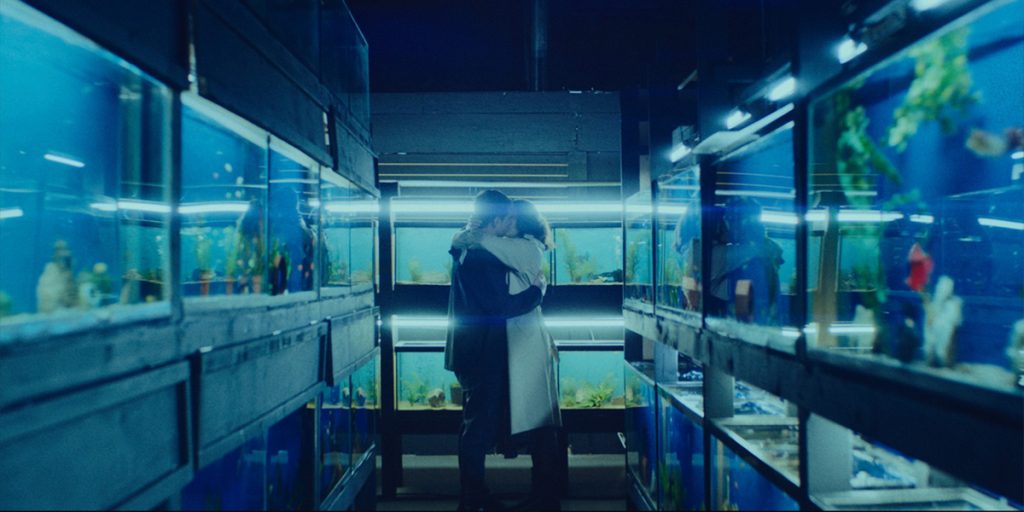A film created before COVID, Little Fish ’s story of a sudden pandemic shares a relevant and strangely cathartic perspective on reckoning with memory and loss.
“We’d hear stories from somewhere like the coast of Maryland or Florida. Always there, not here,” narrates Emma (Olivia Cooke), describing incidents where a rescued fisherman forgot how to pilot his boat and tried to swim to shore and a woman running a marathon forgot to stop. “There’s something quite beautiful to these stories, at first. But then a pilot forgot how to fly.” A new pandemic has gripped the world in Chad Hartigan’s new feature Little Fish — not COVID, but a virus called Neuroinflammatory Affliction (NIA) that erases its victims’ memory. While the film predates COVID, it bears eerie similarities to real world events and offers striking thematic relevance to a world reckoning with its own traumas and memories of a now unfamiliar past.
Little Fish follows Emma and Jude (Jack O’Connell), a twenty-something year old married couple living in Seattle during the outbreak of the NIA pandemic. At first, the outbreak feels like a distant event and they can’t make much sense of it. However, the tragic consequences of NIA begin to hit close to home as Emma’s mother, who lives in England, becomes infected. They also witness the harrowing disintegration of their friends Ben (Raúl Castillo) and Samantha’s (Soko) relationship after Ben starts losing his memory and is driven into violent, fearful outbursts. Once Emma begins to notice Jude forgetting small details, she seeks to find him a cure in a strange medical procedure before his memory completely disappears. Throughout the film’s nonlinear narrative structure, the story takes frequent departures into their past as the couple reminisces over the early days of their relationship, now starting to fade under the shadow of the mysterious virus.
For a film set in Seattle, it’s refreshing that Little Fish avoids the annoying trope of Space Needle establishing shots from geographically impossibly points in the city. It’s also refreshing to see other noticeable Seattle locations like Gas Works Park, and while it’s obvious that much of this was filmed in British Columbia, Hartigan and cinematographer Sean McElwee display the natural beauty of the Pacific Northwest with reverential images of lush evergreen forests and chill waterside scenery.

It’s often easy to get swept into the film’s contemplative and sentimental atmosphere with its gracefully moving images and composer Keegan DeWitt’s ethereal score adds an appropriately dreamlike dimension, as the story oscillates between past and present and drifts in and out of reality and imagined memory. In between this oneiric lull are occasional moments of heightened distress, like a ferry passenger’s instant NIA outburst or a squirm-inducing medical procedure that perfectly fit within the story, but the film can’t always rectify these tonal jumps into a smooth whole. Meanwhile, the smaller moments of reaction and revelation are the most emotionally impactful and there’s a pervasive sense of melancholy that sticks around long after viewing. Towards the end, the film reaches for some ambitious emotional highs it can never quite reach and, unfortunately, the weak link seems to be Emma and Jude, because their characters lack much of a memorable personality to latch on to.
Regardless that this was written and began production almost a year before COVID, it’s impossible to divorce Little Fish from the context of its release. Beyond its general pandemic narrative, it’s strangely prescient that this film takes place in Seattle, which was where the first COVID case in the United States was reported and later a hotspot for the virus in the early days of the outbreak. Yet, Little Fish is more than just a curiosity of its time, as the film follows a similar emotional narrative to our reckoning with the real pandemic—the confusion, the uncertainty, the unease of travelling through a world turned upside down and suddenly experiencing loss.
NIA does not kill its victims, but the loss of memory becomes a kind of “death” where their identity is erased and bonds of friendship, family, and love are forever cut. When the victims lose their memory, their loved ones suddenly feel lost, having to grieve and make sense of a strange new world where friends and family are still alive, but are not the same person and these relationships can never return. There is no “normal” anymore, and that’s a difficult reality to confront. It’s difficult to recommend Little Fish with its pandemic setting and narrative of grief and loss, but if you’re willing to take the chance to surrender yourself to the film’s emotional journey, flawed as it is, you may find it unexpectedly cathartic.
Little Fish was released in US Theaters and On Demand on February 5, 2021.

